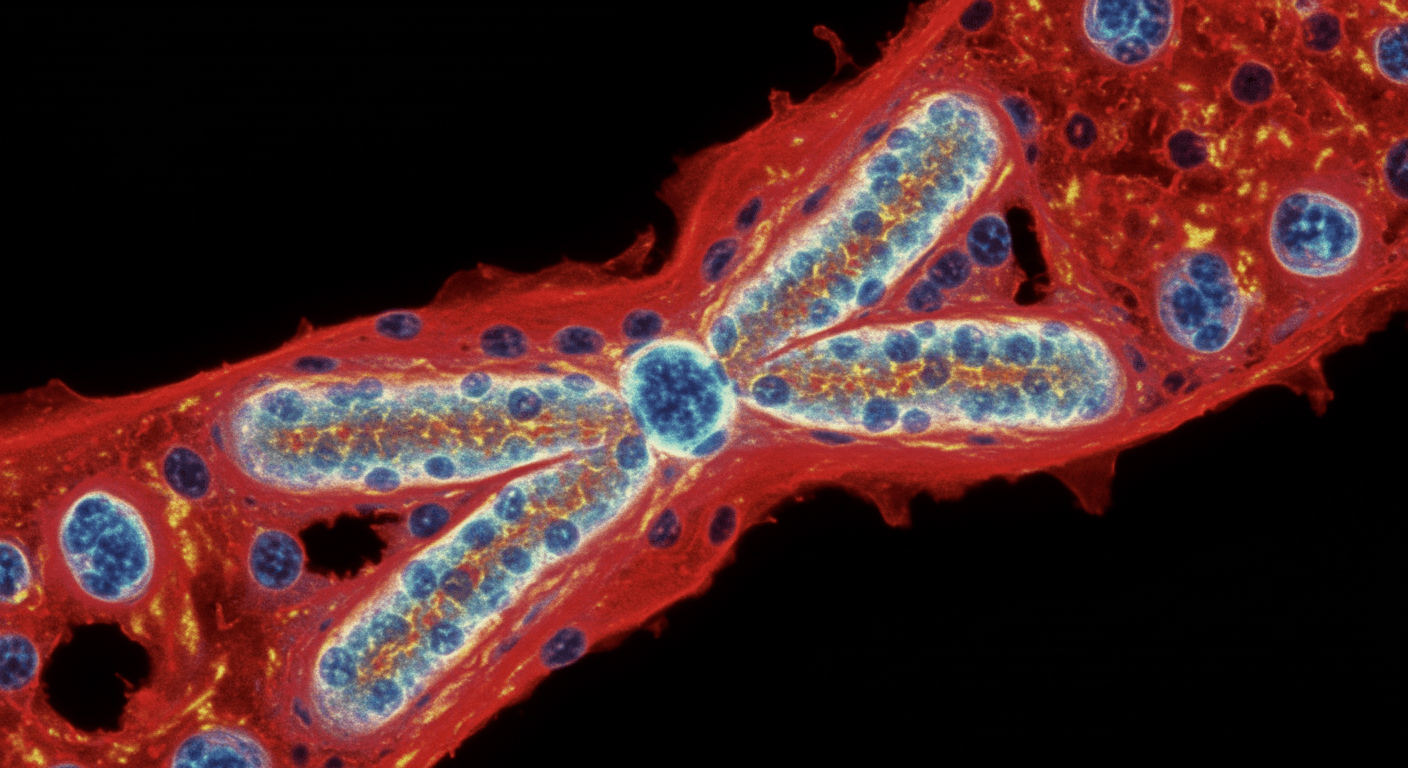Have you ever thought about why some people appear to get over hard circumstances quickly while others have a hard time? It’s like seeing a superhero movie when one person has all the powers and another can barely raise a spoon. Genetics is one important thing that affects how we feel when we’re depressed. In this post, we’ll look closely at how our genes affect our mental health and how they form our emotional lives.
Top Takeaways and Key Concepts
- Understand your genetic predisposition: Knowing family history helps guide mental health strategies.
- Support your genes with lifestyle: Exercise, sleep, nutrition, and mindfulness can reduce depression risk.
- Seek professional help: Therapists provide tools to manage genetic and environmental mental health factors.
- Build a support network: Friends, family, and groups strengthen resilience and emotional well-being.
- Use epigenetics to your advantage: Positive experiences and habits can activate or deactivate depression-related genes.
Summary:
The text explores how genetics influences depression, emphasizing that 40–50% of risk may be inherited, particularly through genes affecting neurotransmitters like serotonin, dopamine, and norepinephrine. Family history increases vulnerability, but genes are not destiny—environment, lifestyle, and personal choices also shape mental health. Epigenetics shows that behaviors like exercise, mindfulness, and nutrition can modify gene expression, helping counteract inherited risks. Developing resilience, building strong support systems, and seeking professional help further improve outcomes. Overall, understanding genetics empowers proactive strategies, combining lifestyle changes, therapy, and social support to manage depression and enhance well-being.
What Are Genes and How Do They Work?
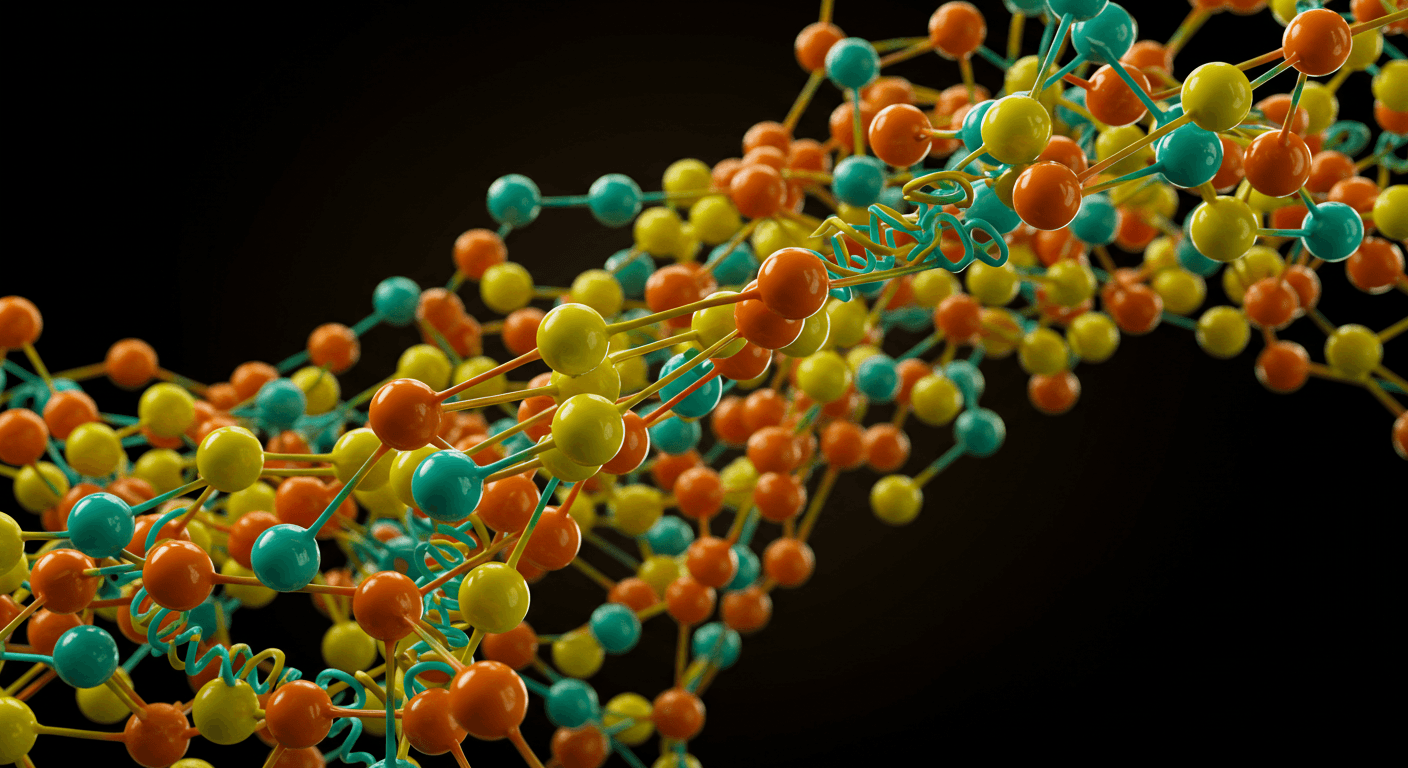
Please Note: This post may contain affiliate links. If you click one of them, we may receive a commission at no extra cost to you. As an Amazon Associate, I earn from qualifying purchases.
Did you know that about 40-50% of the risk for developing depression can be traced back to your genes? It’s like a genetic lottery where some people win the “happy” ticket while others get stuck with “sad.” So, if you’re feeling down, remember—it might just be in your DNA!
“Genetics is a way of preventing yourself from being too much like your parents.” — David Sedaris
Let’s start by talking about genes. You may think of them as little instruction books that are hidden in every cell of your body. They inform your body how to grow, develop, and work, like a recipe for baking cookies but much more complicated. Our parents give us these instructions, which is why you might have your mom’s curly hair or your dad’s ability to crack dad jokes.
These genetic blueprints also affect our mental health in ways that can be really surprising, which is interesting. Think of your genes as microscopic architects that build the framework of your mental health. Some research suggests that some genes can make people more likely to get depressed. These genes work like a set of instructions for how our brains deal with stress and unhappiness. It’s like having a built-in meter for how sensitive you are!
For example, differences in some genes that affect serotonin, the neurotransmitter in our brains that makes us feel good, have a big effect on mood. People typically call serotonin the “happy hormone” because it helps keep our feelings constant and balanced. Genetic differences that change how serotonin works or is made can make our moods change, which can make us feel sad or nervous more often than other people. So if you’re feeling down, it might not just be because you had a poor day at work or got into a fight with a friend; it could be in your genes!
Genes: The Tiny Bosses of Your Mood
– DNA is like a recipe book: Your genes are instructions that tell your body how to make everything, including proteins that affect your mood. So, if you’re feeling “blah,” it might be because your genetic recipe is missing some sprinkles!
– You share genes with bananas: That’s right! Humans have about 60% of the same DNA as bananas. So next time you feel down, just remember—you’re basically a fruit salad waiting to happen!
– Genes can dance: Well, not literally! But certain genes can turn on or off based on what you eat or how much you exercise. It’s like they’re having their own little party in your cells, and guess what? The more fun they have, the better your mood can be!
Let’s delve into this even more: remember those times when everything looked dull and lifeless. You probably know those days when even chocolate cake is not tempting? Such time frames might relate to how well your body gives serotonin a walk in the park because of those annoying gene variations. Some people could discover that they simply make less serotonin or that their receptors are less responsive to itjust like you were trying to use Wi-Fi but only had one bar of signal strength!
Scientists find out more about other neurotransmitters as well, for example, dopamine and norepinephrine that decide the mood and behavior of a person. These factors are also influenced by genetics! So, if you ever thought that you were on a crazy emotional roller-coaster, maybe your genetic makeup is what makes the ride so wild.
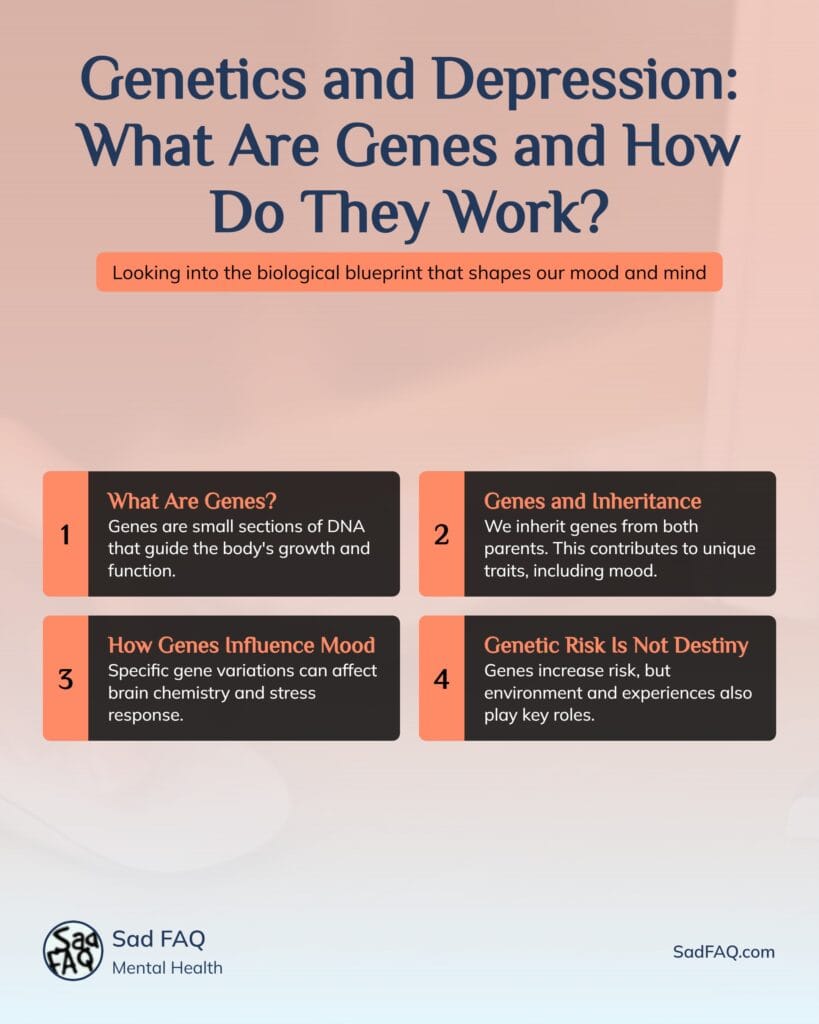
But here’s the catch: knowing this relationship doesn’t imply we can’t fight against our inherited predispositions. It gives us more ways to learn and take action! We can look for techniques that are right for us by understanding that some parts of our mental health may be passed down from our parents. Knowing the fundamental causes provides us tools to fight back, whether it’s treatment to help with symptoms or adjustments to our diet and exercise to naturally raise serotonin levels.
Genetics do have a part in how likely we are to get depressed, but they don’t have all the answers. These genetic elements are always interacting with our experiences, environment, and decisions. This makes mental health a complicated issue that needs careful thought and understanding!
Family History: The Genetic Connection
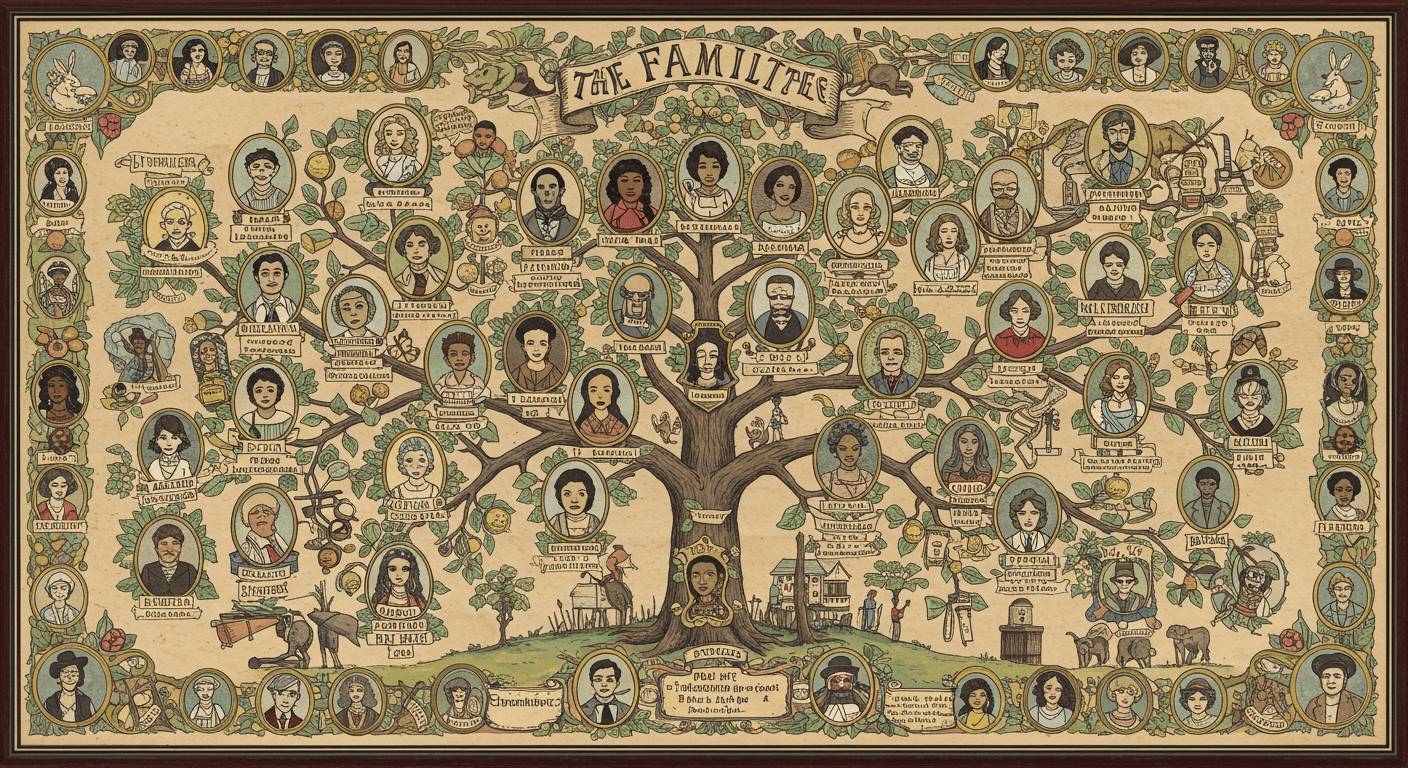
If your family tree looks more like a twisted vine, you might want to check in on your relatives’ moods! Studies show that if one of your parents has experienced depression, you’re about twice as likely to feel the blues yourself. It’s like inheriting a pair of jeans that are just a little too tight—uncomfortable and hard to shake off!
“Just because you have a family history doesn’t mean you have to follow it.” — Ellen DeGeneres
Let’s speak about family trees now. They can be hard to understand because they have branches full of relatives who may or may not comprehend what “social distancing” entails. If someone in your family has had trouble with depression, you could have to deal with the same things. Having a parent or sibling who is depressed makes it more likely that you will be depressed yourself.
But wait! This doesn’t imply you have to follow in their footsteps like a shadow that won’t go away. Genetics isn’t everything; it’s just one piece of the jigsaw. Luckily, we have a lot more pieces to work with! If your genes are like a cake recipe, they tell you what ingredients to use, but how you mix those ingredients together will have a big effect on how the cake turns out.
Stress levels and support systems are two examples of environmental factors that have a big effect. It would be hard to prepare that cake in a messy kitchen if someone constantly throwing flour around (not enjoyable!). There are many things that might cause stress, such employment, problems in a relationship, or even just the daily grind of life. When we’re under a lot of stress all the time, it can bring out our inherent tendencies to be depressed. It’s like putting a light to some dry kindling; things may get out of hand fast!
Family Ties: Genes and Your Mood
– Your genes are like family gossip: Just as families pass down stories, they also pass down genes. If your great-aunt Mildred was always grumpy, there’s a chance you might inherit that frown—thanks, Aunt Mildred!
– Siblings share more than just toys: On average, siblings share about 50% of their genes. So if your brother is a cheerful morning person and you’re a moody night owl, it’s not just sibling rivalry—it’s genetic!
– Family trees can get tangled: Studies show that if someone in your family has depression, your risk increases too. It’s like having a family reunion where everyone brings their emotional baggage—and the snacks are mysteriously missing!
Support systems that are strong are like a team of sous chefs that are at your disposal to help you whip up something amazing. Friends and family who not only listen but also understand your situation can do wonders for you when you are feeling down. They bring to you the cheer and the outlook which may be a counterbalance against the persistent genetic fads towards being gloomy. So in the event that Aunt Edna has been fighting her inner demons for years, it doesn’t imply that you will become a member of her club! You have your own distinct recipeand believe me, yours could be much sweeter!
Moreover, there is new research that shows how the lifestyle can affect gene expression through epigenetics, a process that changes genes. This implies that even if you have genes that predispose you to depression, your surroundings and habits can actually activate or deactivate those genes! It is similar to the case of your body having its own dimmer switch for the control of mood. Proper nutrition, regular physical activity, adequate sleep, and the practice of mindfulness are all means by which one can possibly keep the “depression” lights low.
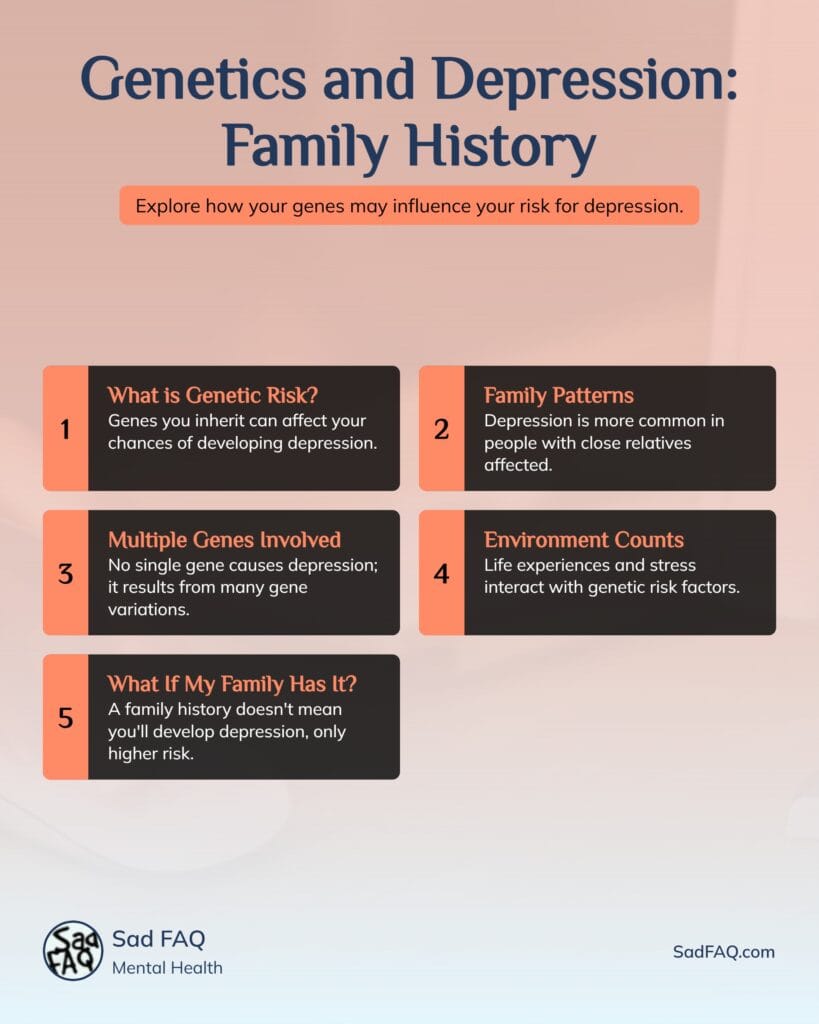
Don’t forget about personal resilience, which is the ability to get back up after a setback. Some people seem to have a natural ability to bounce back emotionally, while others may need to work on it over time. Therapy or self-help methods like writing or meditation can help you develop this skill. Having skills in your toolbox might help you get through tough times without giving up when life throws you curveballs (and it will).
Genetics does have an effect on our mental health, but it’s not the only thing that matters. We can make healthier choices in the future by understanding how our inherent features and the environment (as well as our own behaviors) affect each other. You’re not just a product of your family tree; you’re also writing your own story!
The Role of Epigenetics

Did you know that your genes can be like a light switch? Epigenetics is the science of how environmental factors can turn your genes on or off, like flipping a switch! So, if your great-aunt Edna had a penchant for cookies and naps during stressful times, her choices might influence how you handle stress too—thanks to epigenetics. Just think of it as family bonding over genetics, but with more cookies!
“Your past is not your potential. In any hour, you can choose to liberate the future.” — Marilyn Ferguson
When it comes to environmental influences, epigenetics offers an interesting new twist! This fancy word means changes in how genes are expressed that happen because of things outside the body, without changing the DNA sequence itself. Epigenetics is like putting on sunglasses that make everything look brighter without changing the sun itself.
Trauma or long-term stress can turn some genes on or off, just like switching a light switch. It’s a really interesting idea, like our genes have their own little control panel! When we go through a lot of stress or trauma, it might turn on certain genetic pathways that can make us feel depressed or anxious. Think of your genes as actors in a play. Sometimes they are on stage giving great performances, and other times they are backstage waiting for the proper signal to shine.
So, even if you have genes that make you more likely to be depressed, good things that happen in your life could help lessen those impacts. Just because the script hints at something bad doesn’t mean the whole plot has to be sad. Positive experiences, such as cultivating significant relationships, attaining personal objectives, or simply relishing moments of bliss, can act as luminous beacons that reveal the obscured aspects of our genetic predispositions. These happy times can help you deal with the problems that will come up in life.
Genes with a Twist: The Quirky World of Epigenetics
– Your genes can change their minds: Imagine if your genes had moods! Epigenetics is like a dimmer switch for your DNA, allowing it to turn up or down based on your environment. So, if you eat kale instead of donuts, you might just brighten up those gloomy genes!
– Stress can be contagious: Just like yawning, stress can spread through families. If your parents were stressed out about everything from the weather to that mysterious sock disappearance, their epigenetic changes might pass down to you—thanks for the anxiety, Mom and Dad!
– Epigenetics loves a good party: Certain experiences—like exercise or meditation—can change how your genes express themselves. It’s like throwing a wild party for your DNA; invite healthy habits and watch them dance away the blues!
Simply saying, genetics can show the scenario of having some difficulties with but they do not change the entire story! We all have the power to add our lines and manage our own narratives. In other words, for example, participating in activities that make you happy and give you a sense of accomplishment can result in neurochemical changes in the brain that fight against those negative tendencies associated with the inheritance of genes. Therefore, deciding on your new hobby, community volunteering, or time with family will definitely make a difference!
Studies indicate that toughness is a characteristic that can be influenced by both heredity and the environment. It means that some resilient people are born so because of their genes, while the others can gradually develop such a trait through establishing relationships with supportive people and having good experiences. It’s kinda like working out; you don’t just get the ability to lift heavy weights in the gym or even at home. You have to work for it.
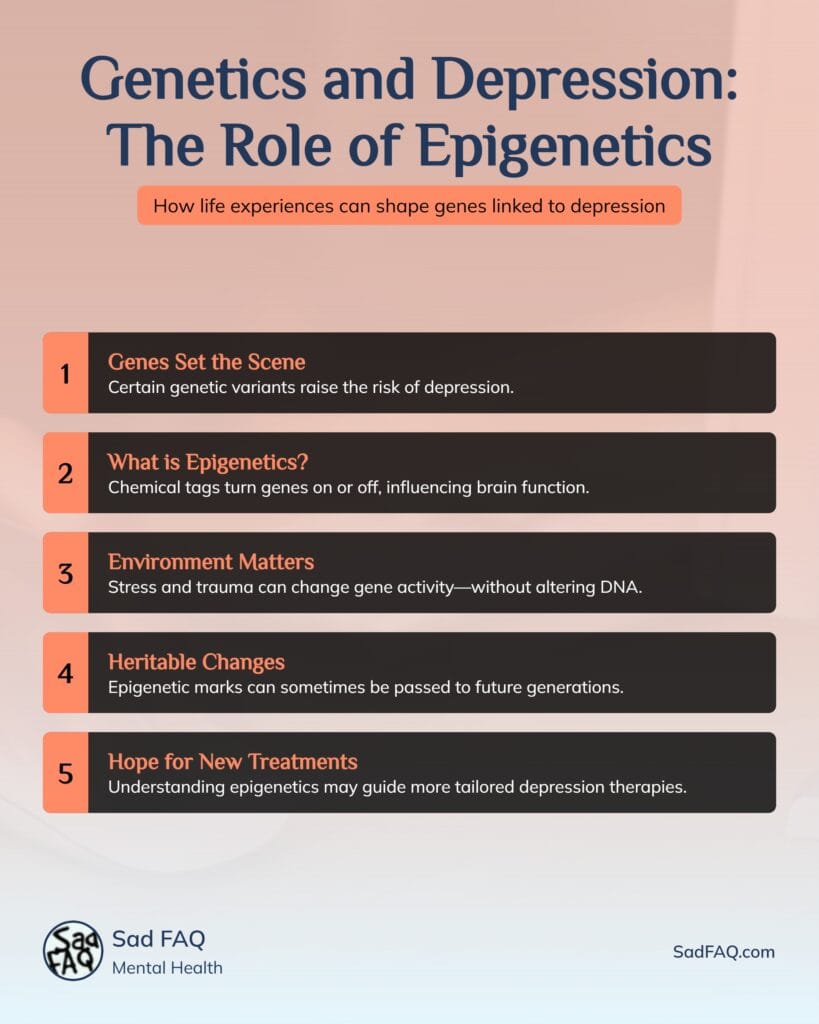
Think about how things like meditation and yoga can help too. These activities not only help us relax, but they can also transform how our brains deal with stress and emotional problems. They help us develop abilities for being aware and controlling our emotions, which protect us from those annoying genetic factors that want to bring us down into despair.
If you ever feel like your family’s history of mental health problems is too much for you to handle, remember that you have more power than you believe! You’re not just reacting to what was given to you when you focus on making good things happen in your life and building your own strength. You’re actively making your own story, one full of hope and possibility!
How Can We Manage Genetic Risk?

Did you know that managing your genetic risk for depression can be as simple as keeping a plant alive? Studies suggest that nurturing plants can improve mood and mental health, making you feel like a proud parent—minus the college tuition! So, if you’re worried about those pesky genes, just remember: if you can keep a cactus thriving, you might just outsmart your DNA!
“Life is what happens when you’re busy making other plans.” — John Lennon
So, what should we do if we find out that depression runs in our family? First of all, knowledge is power! Knowing our genetic predispositions helps us take efforts to improve our mental health. Regular visits with mental health specialists can give you support that is tailored to your personal requirements.
Also, the decisions you make in your daily life are more important than you might believe. It’s as if we’re all the directors of our own tiny movies, and every choice we make can change the story. Regular exercise releases endorphins, which are chemicals that make you feel better, and it can help lower some of the inherited risks that come with depression. Endorphins are like your body’s cheerleaders, telling you “You got this!” after a solid workout. Getting your heart rate up can be a great way to feel better, whether you’re dancing in your living room or running down the street while attempting to avoid squirrels.
I know what you’re thinking: “But exercising is hard!” To be honest, it doesn’t have to be a long run or a hard workout at the gym. Doing things like going for quick walks or playing tag with your kids can make a big difference. The most important thing is to be consistent. If you make exercise a regular part of your day, you’ll release those happy chemicals more regularly. Also, there’s something really fulfilling about working up a sweat, even if you’re simply trying not to trip over your own feet!
Taming Your Genes: Fun Facts About Managing Genetic Risk
– Your genes are not your destiny: Just because you have a family history of depression doesn’t mean you’re doomed to feel the same way. Think of your genes like a pair of shoes—sure, they might be tight, but with the right adjustments (like therapy or exercise), you can walk comfortably!
– Food can change your mood: Eating healthy foods is like giving your genes a pep talk! Foods rich in omega-3s, like fish and nuts, can help keep those pesky depressive genes in check. So next time you’re feeling down, consider swapping that pizza for some salmon!
– Exercise is a gene’s best friend: Getting moving isn’t just good for your body; it’s also great for your genes! Regular exercise can help reduce genetic risk factors for depression. It’s like telling your DNA to hit the gym and get strong—who knew working out could be so empowering?
It is well-known that eating balanced meals that are rich in vitamins is beneficial to brain chemistry. Maybe you could try to avoid chips for some time? I mean, potato chips are as much a part of my life as they are of yours (in fact, who doesn’t love munching mindlessly?), but we have a lot of great snacks that are actually good for our brains to work properly. Superfoods high in omega-3 fatty acids such as salmon and walnuts are being promoted for their anxiolytic qualities. Capitalizing on the catchy slogan “Fruits and veggies are the new candies of the world,” producers of fruit and vegetable juices are emphasizing the vitamins the brain requests in their products.
Diets consisting of processed foods and sugars have been linked to an increased risk of anxiety and depression, according to research. So, after weighing all the pros and cons, the question: “Are we going to eat what is better for our brains or not?” might be raised. Just think about it! Instead of eating those fatty foods, you could eat a colorful salad or drink a delicious smoothie… you’re not doing it for your body, you’re doing it for your brain. That’s like having a spa day for your brain, and you’re letting it have a blast!
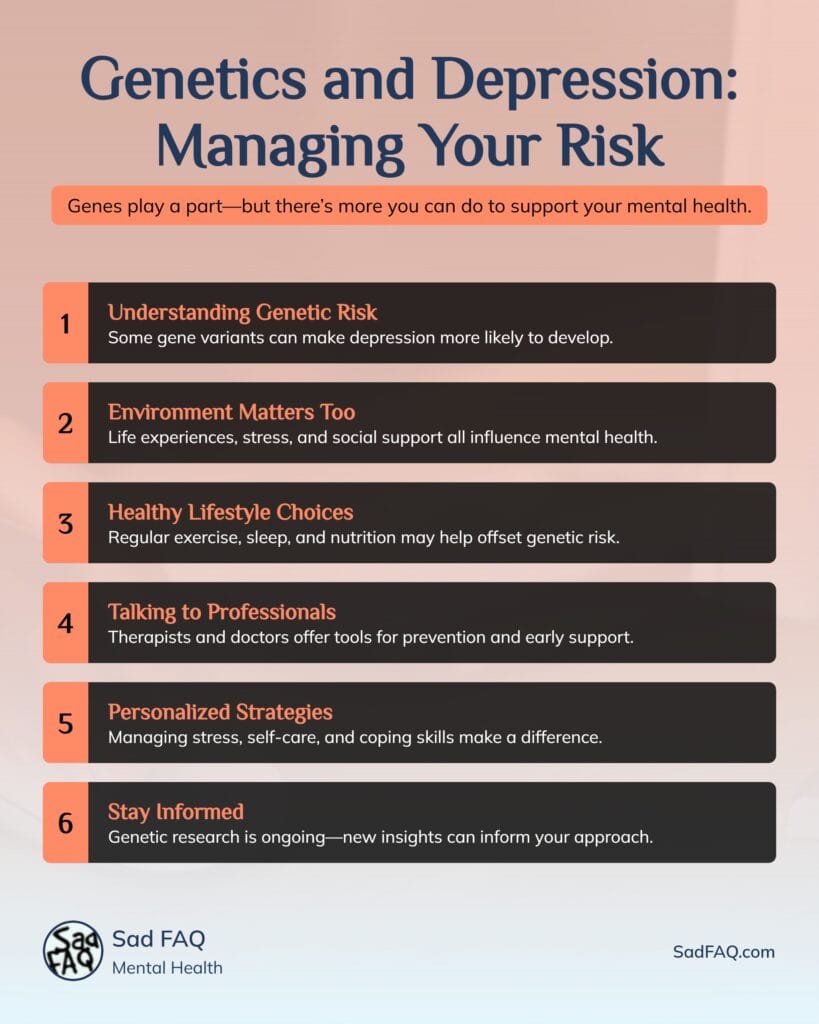
Don’t forget how important it is to stay hydrated! Water is very important for keeping the brain working well. When you’re attempting to keep your depression symptoms at bay, being tired and irritable is not what you want. So, get that water bottle and think about how plants brighten up after a good drink. You should also get that kind of rest.
Making healthy decisions isn’t just about how we appear on the surface; it’s also about taking care of our minds from the inside. We are actively fighting any hereditary predispositions toward depression by making sure we get enough exercise and eat healthy meals every day. Who would have thought that being aware of what we eat and how we move could be so helpful? So go ahead and dance like no one is watching (but maybe check for neighbors first). You have the power to make your own mental health tale, so treat yourself to some healthy food!
Seeking Help: Therapy and Support Systems

Did you know that talking to a therapist can be like having a personal trainer for your brain? Just like how trainers help you lift weights, therapists help you lift emotional baggage—without the sweat and spandex! Plus, there’s no need to worry about dropping any weights on your toes.
“Sometimes the most productive thing you can do is relax.” — Mark Black
It’s important to get professional help for any mental health problem, even those that are genetic. In addition to self-care techniques like exercise and eating well, it’s also important to get professional support. Therapists have tools that help them understand and deal with our emotions. They’re like GPS systems that help us get through tough situations.
Support systems are also very important. Friends who listen or family members who cheer you on can make a big difference when things get tough. To be honest, everyone needs someone who gets what they’re going through, even if it’s just someone who sends them hilarious cat videos. You know those times when you’re sad and a friend sends you a text that says, “Hey, I’m here for you”? It feels like a warm hug. That’s the magic of being connected!
When things get tough, having people on your side can help. When was the last time you had a bad day and just needed to let it out? You might have contacted your best friend or even your mom, and all of a sudden, things didn’t seem so bad. They might not have all the answers—let’s be honest, no one does—but simply knowing they care might make you feel a lot better. It’s like having a safety net that catches you before you fall to the ground.
Finding Help: Fun Facts About Therapy and Support Systems
– Therapy can be like a video game: Just like leveling up in your favorite game, therapy helps you gain skills to tackle life’s challenges. Each session is like earning experience points that make you stronger—no cheat codes required!
– Support groups can feel like a potluck dinner: Everyone brings their own stories and experiences, creating a delicious mix of support. Plus, you get to share laughs and snacks while figuring out how to handle life’s ups and downs together!
– Talking it out is scientifically proven: Sharing your feelings with someone can actually change the way your brain works! It’s like giving your mind a software update, helping it run smoother and deal with stress better—who knew chatting could be so high-tech?
Most important of all – let’s acknowledge that laughter is sometimes what we most need. Sharing funny cat videos (or any animal antics) with friends is a great way to cheer up even the bleakest of days! Watching a cute little kitten rolling over its own paws seems to make the world lighter, I mean, don’t you think? Comedy has this amazing power to clear up the dark clouds and give us a glimpse of happiness which is there even in small amounts.
However, support does not necessarily have to come from friends or family who are near; it can also be in places where you least expect it. Signing up for groups or clubs that are centered on people with similar likes can help you find new friends. Be it a book club packed with fellow literature enthusiasts or a jogging group where everyone pushes each other to go that extra mile, such communities can be a valuable source of emotional support as well. Besides, the new people we meet often offer us a fresh view of life!
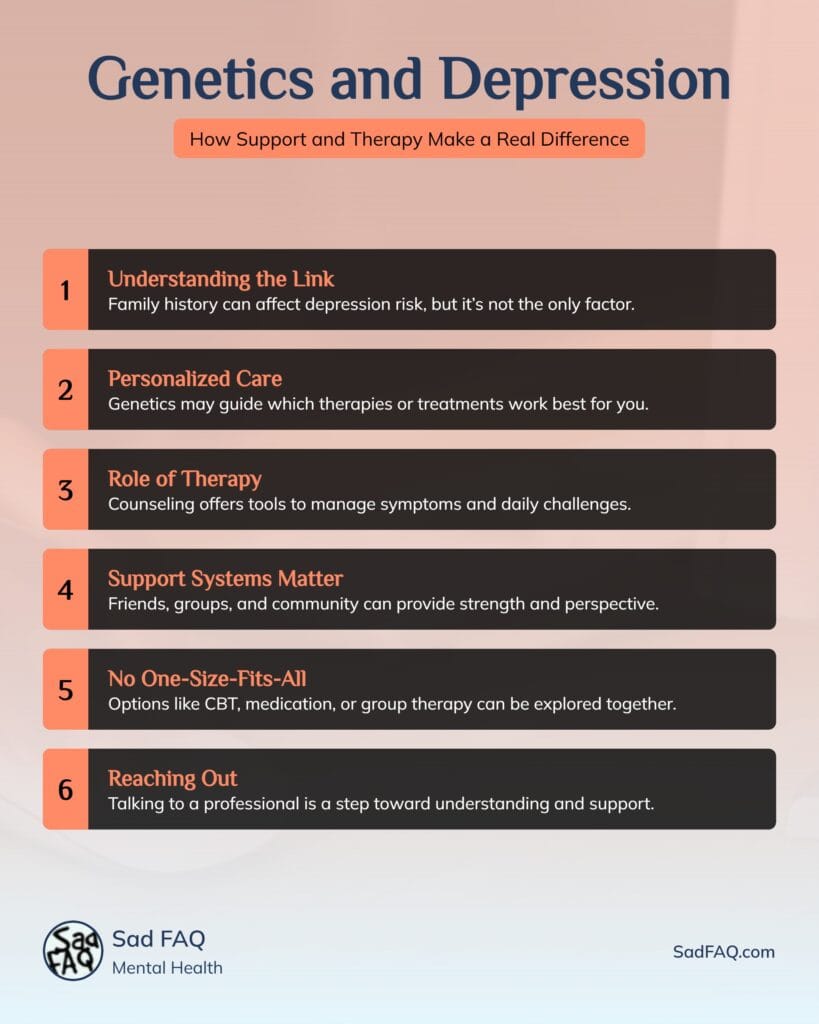
Let’s not forget about expert help on top of that! Therapists and counselors are trained to assist people get through hard times and give them tools to deal with mental health issues. It’s like having your own cheerleader that can help you deal with those hard feelings right away! Asking for help doesn’t mean you’re weak; it means you’re strong and brave because you’re taking steps to get better.
It’s really important for our mental health to build and take care of our support systems. These relationships remind us that we’re not alone on this rollercoaster ride called life. They could be talking to old pals over coffee or finding comfort in online groups full of people who understand. So why not get in touch today? Send that text or join that group you’ve been thinking about. You never know what kind of positive relationships are waiting for you just around the bend!
The Future of Genetic Research
Finally, let’s take a look at what the future holds for research on genetics and depression! Scientists are always looking for innovative ways to learn more about how certain genes affect mental health problems. As technology moves at breakneck pace (really, it seems like yesterday when flip phones were popular), we will probably find even more links between genetics and mental health.
In conclusion—and I’m sure you’ve figured this out by now—genetics has a big impact on how we feel depression, but it doesn’t define them completely! We can live better lives by learning about our genetics and using proactive methods to deal with mental health issues.
Suggested Resources
Understanding Genetics and Mental Health
https://www.nimh.nih.gov/health/publications/understanding-genetics-and-mental-health
Genetic Factors Contributing to Depression
https://www.ncbi.nlm.nih.gov/pmc/articles/PMC6784731/
The Impact of Family History on Mental Health
https://www.psychologytoday.com/us/blog/the-moment-youth/202003/the-impact-family-history-mental-health
Frequently Asked Questions
How do genetics influence the risk of depression?
Genes can affect neurotransmitters like serotonin and dopamine, influencing how the brain manages stress and mood. Family history can increase vulnerability but does not guarantee depression.
Does having a family history of depression mean I will develop it?
No. A family history raises risk but does not determine your future. Lifestyle choices, environment, coping skills, and support systems all influence mental health outcomes.
What is epigenetics and how does it relate to depression?
Epigenetics refers to changes in gene expression caused by environment and behavior. Positive habits like exercise and mindfulness can help reduce activation of depression-related genes.
Can lifestyle changes reduce genetic risk for depression?
Yes. Regular exercise, quality sleep, balanced nutrition, and stress-management practices can improve mood regulation and help counteract inherited vulnerabilities.
How do neurotransmitters relate to genetically influenced depression?
Genetic variations may affect how neurotransmitters like serotonin, dopamine, and norepinephrine function, influencing mood stability and emotional resilience.
When should someone with a genetic predisposition seek help?
Seek help when symptoms affect daily functioning, persist over time, or feel overwhelming. Therapists can provide tools to manage both genetic and environmental factors.
Can support systems help even if depression is genetic?
Yes. Strong support from friends, family, or groups improves resilience, eases emotional strain, and provides encouragement regardless of genetic risk.

Kevin Collier is a passionate mental health advocate and writer for SadFAQ.com, where he explores the complexities of depression and mental well-being. With a deep understanding of mental health challenges, Kevin provides compassionate insights and practical advice to help individuals navigate their journeys toward healing. His articles aim to destigmatize mental health issues, offering support and resources for those seeking to improve their emotional resilience. Committed to raising awareness and fostering open conversations, Kevin’s work empowers readers to prioritize their mental health and seek the support they deserve.

